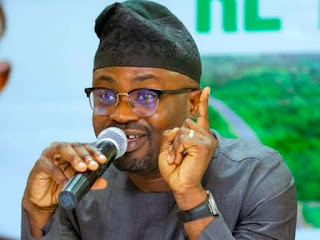Senior Advocate of the Masses
I have watched
closely enough to realize that being an advocate is no longer restricted to
legal practitioners dressed in apparel, working in a law firm and handling
lawsuits in the court of law. At some point in life, one will need one of these
advocates to speak for the masses where there is an infringement on citizens’
rights. Only a few persons are in that position advocating for Nigerians
without being in the court of law or panel of judges.
I
remember as far back as June 2005 in Abuja, the unfortunate police brutality
case of six Nigerian youths that needed a strong voice from the presidency but
there was no one to get the “Apo six” justice. Hence it was swept under the
carpet.
Fortunately,
we now have a member of the presidency who has fashioned out a perpetual
solution to this societal ill that arose again in October 2020. 15 years down
the line, the “Apo six” families each got compensation of ₦200 million after a
fair hearing from the judicial panel of inquiry.
Here
you will meet our Senior Advocate of the masses standing for us beyond the
borders of his constitutional roles, currently receiving the reports of his
effort through the state judicial panels of inquiry set up nationwide, and the
successful journey on this advocacy thus far.
On
October 4 2020, he summoned the erstwhile Inspector General of Police, Mohammed
Adamu, over rising concerns of brutality, assault and extrajudicial killings by
members of the now-disbanded police unit – Special Anti-robbery Squad (SARS)
and the general police force.
After
the meeting, he addressed the press and described the situation as deeply
unpleasant stating that you cannot have a situation where SARS says they are
investigating cybercrime by arresting young men and women carrying their
laptops and phones. “Cybercrime is an electronic crime. I don’t see how you can
investigate that by seizing people’s phones in a taxi or in their cars.”
On
October 7, he met with the Minister of Police Affairs, Muhammad Dingyadi,
Inspector-General of Police, Mohammed Adamu, Director-General of State Security
Services (SSS), Yusuf Bichi, and the Executive Secretary of the Nigerian Human
Rights Commission (NHRC), Anthony Ojukwu at the Presidential Villa in Abuja. The
meeting was based on discussions on ending police brutality and reforming the
police force in Nigeria.
On
October 9, he went along with IGP Muhammad Adamu to meet with President Buhari
to discuss the decisions made from the previous meeting held with other
security stakeholders on October 7th 2020, particularly concerning possible
disbandment of SARS and the implementation of reforms in the Nigerian police
force.
On
October 11, he ensured the President officially disbanded SARS through the
Inspector General of Police.
On
October 12, the President officially spoke and affirmed the disbandment of SARS
at the launch of the Presidential Youth Empowerment Scheme in Abuja. The
President noted that the disbandment was only the first step, adding that the police
reforms will ensure the police’s primary duty remains the protection of lives
and properties and that all culprits of police brutality are brought to
justice.
That
same day after the President spoke on the disbandment of SARS, he also spoke
with the press and restated the government’s commitment. He said, “I think the
clear message is that there is a government commitment to ensuring that the
process of reform is done and those who have committed wrongful acts are duly
investigated and prosecuted; and whatever replaces SARS is something that is
acceptable, first of all, in its compliance to all the tenets of the rule of
law and human rights.”
On
October 15, he chaired the National Economic Council meeting and directed the
immediate establishment of Judicial Panels of Inquiry in each state of the
country and the FCT. These Judicial Panels of Inquiry investigated all issues
of police brutality or related extra-judicial killings petitioned to them and
proffer justice to all victims (or their families) of the dissolved SARS and
other police units.
On
October 16, he highlighted all the measures taken to meet the demands of
ENDSARS protesters which involve setting up the Judicial Panels of Inquiry and
a victims’ support fund to compensate victims and their families for any
consequences of police violence they may have suffered.
On
October 21, he apologized to Nigerians for the incident at the Lekki toll-gate
and the loss of lives and properties across the country.
By
October 23 through November 3, states had set up Judicial Panels of Inquiry to
bring justice for SARS/police brutality victims.
On
the 26th of October, another emergency National Economic Council meeting was
held and a committee was set up to engage the youths, representatives of Civil
Society Organizations, religious and traditional leaders on employment, social
safety net programmes, security, empowerment programmes and national unity
among other key issues of concern. The committee was chaired by him and it
comprised governors representing the six geopolitical zones.
On
November 3 2020, he inaugurated the National Economic Council Ad–HOC Committee
Meeting created to engage with youths, civil society organizations and
different groups and strands of leadership across the nation on the deeper
issues ascertained from the post-ENDSARS protests.
In
course of the last quarter of the year 2020 through 2021, the state judicial
panels of inquiry have heard not less than 100 victims and compensated them.
The Senior Advocate of the masses continues to monitor this process closely and
has begun receiving the panels’ reports since June 17 2021 for the National
Economic Council review.
We
look forward to more of his honest display of care and concern for Nigerian
citizens.
Meshach
Chukwuma writes from Abuja.



Comments
Post a Comment